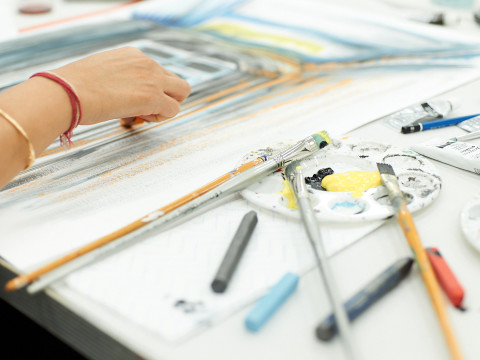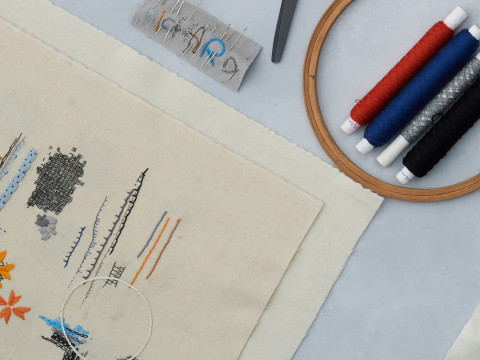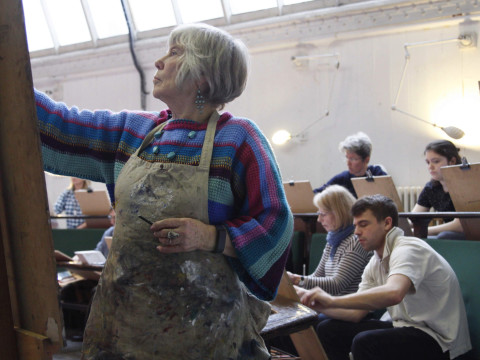
How to write about art
Two-day art theory course
19 November 2017 10am - 5pm
The General Assembly Room, Burlington House, Royal Academy of Arts, Piccadilly
£420. Includes light refreshments on both days and a drinks reception on Saturday evening.
Friends of the RA book first
Terms and conditions
What is the purpose of art criticism, and what does it take to become a successful critic? Led by Thomas Marks, writer and editor of Apollo magazine, this course offers a unique opportunity to learn about the curious history of art journalism while honing your own skills as a writer and critic.
Drawing on their own experiences of writing and publishing, Thomas Marks and other leading art critics and guest speakers will provide exclusive insight into the historical role of criticism and how it relates to the worlds of art and journalism today.
How important have critics been for the interpretation, evaluation, and promotion (or demolition) of artists and exhibitions over the past two centuries? How did the genres of the exhibition review, the artist interview and the critical essay develop? What are the responsibilities of critics, and how difficult is it for them to maintain their integrity and independence in today’s madcap art world?
This weekend course will include a strong practical element, in which participants will consider crucial questions such as the relationship between language, style and individual works of art, and what types of judgement are involved in reviewing exhibitions. Both days will feature a seminar focused on the scrutiny of historical and recent examples of art criticism, as well as a writing exercise in which the fruit of those discussions can be put into practice in the context of the Royal Academy’s autumn exhibition programme.
It has never been harder than it is today to make a living as a critic, but it has never been easier to publish art criticism and get your voice noticed. This course will include practical advice about current and future opportunities in art journalism, and give participants access to the knowledge (and colourful experience) of figures who have – perhaps against the odds – fashioned their careers from it.
£420. Includes light refreshments on both days and a drinks reception on Saturday evening.
Friends of the RA book first
Terms and conditions

About the tutor
Dr Thomas Marks
Dr Thomas Marks was educated at Pembroke College, Cambridge, and Magdalen College, Oxford, from where he holds an MSt in Romantic and Victorian literature and a DPhil on Victorian poetry and architecture. In 2011, he was a founding editor of The Junket, an online quarterly magazine that continues to publish original essays, fiction and poetry. He has written on art and literature for a wide range of publications, including The Telegraph, the Times Literary Supplement, Literary Review, and the New Statesman, and has taught extensively at the University of Oxford on 19th- and 20th-century literature and culture.
Since 2013, Thomas Marks has been the editor of Apollo – one of the world’s most prestigious art magazines, founded in 1925 and renowned for its outstanding and authoritative writing about art, whatever the field or focus, and for its exclusive access to leading artists, collectors, and cultural leaders. During his editorship, Thomas has relaunched the Apollo website as a forum for daily art news, comment and reviews, and established the forward-looking Apollo 40 Under 40, a publication celebrating talented young people in the art world. He writes regularly for the magazine about international artists and exhibitions, and has profiled many major museums around the world.
About the course
This course is for you if:
• You would like to learn new skills to help you describe, interpret and judge art
• You are an aspiring art writer for print or online and want insight and feedback from leading specialists in the field
• You would like the opportunity to develop your writing skills and ideas in a small group setting and get inspiration from peer group discussion and debate
• You want to understand how to write about art and art criticism more widely opportunities in professional art journalism and criticism today
Minimum age 18
This course is suitable for all levels.
£420
Saturday 18 – Sunday 19 November 2017
10.00am – 5.00pm on both days
• Expert-led advice and feedback, including a group discussion and critique
• Written materials and handouts created specifically for the course
• Light refreshments at the beginning of each day
• A drinks reception at the end of the Saturday
• A certificate of participation upon course completion
• A certificate of participation upon course completion
The General Assembly Room was originally a private room in Burlington House, a Palladian mansion set back from Piccadilly and completed in 1668 by its owners, the 1st Earl and Countess of Burlington. After the arrival of the Royal Academy in 1867, the room was transformed into the Chamber for the General Assembly, the Academy’s governing body, and has remained the central meeting room and debating chamber of Academicians who conduct the business of the Academy here up to the present day. It is part of the suite of John Madejski Fine Rooms, the opulent, gilded and frescoed rooms which contain many of the principle works of the Academy’s art collection and have views onto the famous Annenberg Courtyard and its learned societies.
Guest speakers include:
Louisa Buck
Artist and art critic
Louisa Buck is a writer and broadcaster on contemporary art. She has been the London contemporary art columnist for the Art newspaper since 1997 and is a regular reviewer on BBC radio and TV. She writes a bi-weekly visual arts column for the Telegraph Luxury. She is the author of a number of catalogue essays for institutions including Tate, Whitechapel Gallery, ICA London and the Stedelijk Museum in Amsterdam. Her books include Relative Values or What’s Art Worth? (co-authored with Philip Dodd) (BBC Books 1991); Moving Targets 2: A User’s Guide to British Art Now (Tate 2000); Market Matters: The Dynamics of the Contemporary Art Market (Arts Council England 2004) and Owning Art: The Contemporary Art Collector’s Handbook (co-authored with Judith Greer) (Cultureshock Media 2006) Commissioning Contemporary Art : A Handbook for Curators, Collectors and Artists was published by Thames & Hudson in October 2012. Her most recent publication is The Going Public Report (2016) commissioned by Museums Sheffield. Louisa was a judge for the 2005 Turner Prize.
Tim Smith-Laing
Art critic and writer
Dr. Tim Smith-Laing is a writer and arts critic based in London. After taking his BA in English literature from Pembroke College, Cambridge he moved to Oxford, to take an MSt in early modern literature at Balliol College followed by a DPhil in late medieval and early modern mythography at Merton College. Outside Oxford, he has undertaken research at the École Normale Supérieure and teaching at Sciences Politiques in Paris. A lecturer in literature at Jesus College, Oxford for three years, he has taught extensively on early modern literature, cultural history, and the history and theory of criticism. Since leaving academia in 2013 to concentrate on writing and independent research, he has published on subjects ranging from early modern philosophy to Hieronymus Bosch, Paul Valéry, and The Monkees. A book critic at The Telegraph, he is also a regular contributor of features and reviews on art for Apollo and Frieze, and has published fiction, poetry and essays in The Junket. His current projects are a novel based on the life of eighteenth-century German sculptor Franz Xaver Messerschmidt, and a cultural history of chance, titled Fortuna: The Lives of Lady Luck from Ancient Athens to Quantum Physics.
Martin Gayford
Art critic
Martin Gayford studied philosophy at Cambridge and art history at the Courtauld Institute of London University. He has written prolifically about art and jazz, contributing regularly to the Daily Telegraph and also to many art magazines and exhibition catalogues. He was art critic for the Spectator (1994-2002) and subsequently for the Sunday Telegraph before becoming chief art critic for Bloomberg News until 2013. He is now once again art critic for the Spectator. His book about Van Gogh and Gauguin in Arles, The Yellow House (2005) was published in Britain and the USA to critical acclaim, and has been translated to date into five languages. Constable in Love, a study of John Constable’s romance with Maria Bicknell and their lives between 1809 and 1816 was published in 2009 by Penguin Fig Tree; he was also co-curator with Anne Lyles of the exhibition John Constable Portraits at the National Portrait Gallery and Compton Verney in 2009. His portrait by Lucian Freud, Man with a Blue Scarf (2005) has been exhibited at the Correr Museum, Venice and the Museum of Modern Art, New York. His book about posing for Lucian Freud, also entitled Man with a Blue Scarf appeared in 2010. A Bigger Message: Conversations with David Hockney was published by Thames & Hudson in September 2011, and was followed by Michelangelo: His Epic Life in 2013. Rendez-vous with Art was published by Thames & Hudson in 2014, co-authored with the former director of the Metropolitan Museum of Art in New York, Philippe de Montebello. His most recent book is A History of Pictures: From Cave to Computer Screen.

Our courses and classes programme
Our programme of short courses and classes offers the opportunity to explore a range of subjects, led by expert tutors and practising artists.
Related events
 Short courseFree
Short courseFreeThe Primary Art School
9 January - 12 June 2025
 Short course
Short courseBotanical art
11 March - 8 April 2025
 Short course
Short courseExploring ink: method and imagination
29 March - 30 March 2025
 Short course
Short courseDepicting the figure: Renaissance to Modernism
29 April - 27 May 2025
 Short course
Short courseRevolutionaries and Romantics: art and literature in France
17 May - 18 May 2025
 Short course
Short courseOil painting: techniques and discovery
17 May - 18 May 2025
 Short course
Short courseSketch with stitch
21 June - 22 June 2025
 Short course
Short courseConnoisseurship summer school: who painted what, when and how to tell
1 July - 5 July 2025
 Short course
Short courseLife drawing summer school
8 July - 12 July 2025
 Short course
Short courseDrawing with anatomy
15 July - 19 July 2025
 Short course
Short courseExpressive life drawing: observation and imagination
15 July - 19 July 2025
 Short course
Short courseLandscapes: van Gogh and his influence
2 September - 6 September 2025